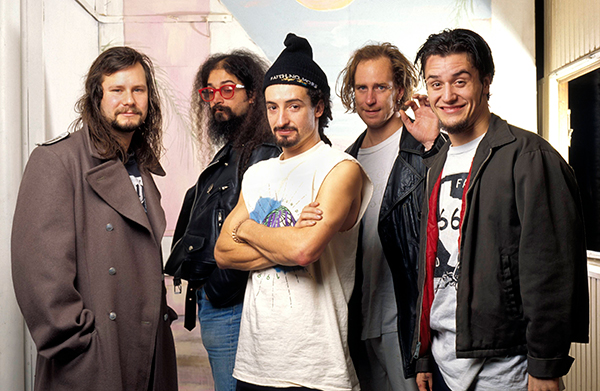Faith No More play by nobody's rules except their own. When the band emerged in the mid-80s, hair metal ruled the roost, the largely LA-focused scene elevating pretty boys with downright ugly attitudes, so long as they could buy into the Reaganomics-friendly narrative that every night was a party and every woman was a conquest waiting to happen.
A little up the road in San Francisco, though, the tides were changing. The advent of thrash metal allowed for bands with more than two braincells to rub between them, looking beyond the four corners of whatever club/strip joint/bedroom/back alley they found themselves in that night to actually write some half-clever songs.
But though they ran in the same circles (and even cribbed the occasional riff), Faith No More didn't quite fit in with thrash, either. Their 1985 debut We Care A Lot was a funk-punk-metal hybrid that refused to sit comfortably in any one scene, an early indicator that a whole new counter-culture movement was on the rise right under everyone's noses. 1989's The Real Thing proved to be the tipping point in the band's career, years of endless touring paying off as the album gained traction and Faith No More became the flagbearers for the appropriately named 'alternative metal' movement that would explode in the early 90s and eventually mutate into nu metal.
Nirvana openly talked about how their own ascension would have been impossible without Faith No More laying the ground for them. Behemoths like Metallica and Guns N' Roses adored them, and when nu metal arose later in the decade there wasn't a band worth their salt that didn't openly attribute their careers to the sonic oddity that was Faith No More. They've been covered by everyone from Between The Buried And Me, Enslaved and Aborted to 36 Crazyfists, Papa Roach and Disturbed, and even managed to beat the comeback curse when 2015's Sol Invictus proved to be every bit as brilliant (and bizarre) as we'd come to expect of the band in the first place.
That in mind, we decided to trawl the ranks of rock, punk and metal to pick out 10 acts that couldn't exist without Faith No More's formidable presence.

1. Korn
Don't worry, we're not just filling this list with every rap metal band that trundled along in the wake of Epic. If Faith No More were planting the seeds for the hip-hop/metal collision at the heart of nu metal on The Real Thing, Korn were the first band of the bunch to truly blossom. For their own part, the members of Korn have never shied away from just how much of an impact FNM had on their sound, with guitarist Brian 'Head' Welch telling Hammer that "all the guys in Korn changed after they heard The Real Thing. It turned them from being the Mötley Crüe guys into something more alternative." Besides, you only have to hear Fieldy's bass-tone to hear the indelible impression Billy Gould's own low-end rumble had on the Bakersfield group.
2. Deftones
The sonic similarities between Deftones and Faith No More aren't as pronounced as with Korn, but there could be no denying that the throughline of sonic eccentricity could be traced right back to messrs Mike Bordin, Roddy Bottum, Billy Gould, Jim Martin, Chuck Mosley and Mike Patton. Incredibly influential in their own right, Deftones were spiritual successors to the 'anything goes' attitude FNM had enabled with alt-metal, expanding the boundaries even further with seminal releases Around The Fur, Adrenaline and White Pony. Vocalist Chino Moreno even guested on a cover of FNM's Zombie Eaters with Latin metal group Ill Niño in 2006.
3. System Of A Down
System Of A Down's sound draws from so many disparate sources that it becomes near impossible to extricate any one band from the mix and say definitively 'SOAD are influenced by this band'. At the same time, such a mix-and-match approach can be almost entirely attributed to Faith No More, one of the first bands to take such an approach and actually come away successful for it. Vocalist Serj Tankian acknowledged as much in a 2015 interview concerning the band's reunion, stating "Faith No More were really big for me and the other guys in System. We learned a lot from touring with Patton too when we got to open for Mr. Bungle. It's one-of-a-kind." It's not hard to see where the band's penchant for gag songs and irreverent off-beat humour came from either, given statements like that.
4. Slipknot
One of the more literal instances on this list, Slipknot's Corey Taylor once related a story that seeing Faith No More playing Epic on TV saved his life after an overdose, saying it was "so good, so powerful, and so different from anything I had ever seen,” that it "got [me] off my ass and I started writing again, making music again." Slipknot's music doesn't lack for that FNM touch either. From the fusion of heavy-as-fuck riffs with massive vocal melodies straight out of classic pop and soul records to the incorporation of samples into their wall of sound (particularly in the early days), Slipknot proved to be yet more acolytes who understood that Faith No More's blueprint wasn't meant to be followed to the letter, but used as a guideline for total sonic anarchy.
5. The Dillinger Escape Plan
The Dillinger Escape Plan's roots with the Faith No More camp – and vocalist Mike Patton in particular – run deep. For starters, TDEP's maniacal and unpredictable style came straight from the Patton playbook, arguably leaning heavier on his work with Mr. Bungle, but undeniably FNM-inspired nonetheless. Patton actually became one of the first people to hear Dillinger's debut Calculating Infinity, subsequently inviting the band to support Mr. Bungle on tour. In 2002 the creative forces collided on the utterly batshit EP Irony Is A Dead Scene, 18 minutes of pure sonic insanity every bit as mental as anything Patton had put his name to in the past. Patton later guested at one of the last shows Dillinger ever played, performing the Irony... EP in full as well as Angel Dust-era thumper Malpractice. Plus, just listen to those off-kilter melodies on Black Bubblegum: pure FNM, through and through.
6. Dog Fashion Disco/Polkadot Cadaver
With effectively the same line-up between the two bands (Polkadot Cadaver being a slimmed-down version of Dog Fashion Disco, sans keyboardist Tim Swanson and saxophonist Matt Rippetoe), the work of Todd Smith's merry band of madmen is a twofer when it comes to bands who most clearly resembled the work of Patton and co. Barmier than a box of frogs and with the sax solos and odd disco sections to augment, Dog Fashion Disco took FNM's sonic eccentricities to their logical conclusion, out-weirding even the likes of System Of A Down in the process. Polkadot Cadaver leaned on the Faith No More influence in a more direct manner, songs like Forever And A Day evoking Underwater Love, while Chloroform Girl calls back to Patton's tendency to wrap unsettling, serial killer inspired lyrical content in a soothing and sweet melody, a la Edge Of The World.
7. Finch
Finch's 2002 debut What It Is To Burn effectively established itself as a microcosm for the shape of the alternative music scene to come as nu metal rapidly fell out of favour. Shades of post-hardcore, emo and pop-punk filtered to varying degrees through the band's discography, but it is in vocalist Nate Barcalow's throaty tones that you can hear the strongest Faith No More influences (similar tones also being adopted by other self-confessed FNM fans Darryl Palumbo of Glassjaw and Brock Lindow of 36 Crazyfists). The 2005 follow-up Say Hello To Sunshine ramped up these influences even more, Barcalow himself admitting that the FNM element had really snuck in amidst the chunkier guitar tones and aggressive energy of their second record. A quick listen to Insomniatic Meat and there's no denying the decided comparisons to King For A Day... Fool For A Lifetime-era Faith No More, Finch even covering The Gentle Art Of Making Enemies in live sets at the time.
8. Killswitch Engage
Killswitch Engage vocalist Jesse Leach wasn't playing coy when he said that Faith No More's 1992 album Angel Dust "changed everything for my generation". Speaking to Hammer in 2020, he said "that’s the one that offered so much creativity to how a song could be written and what you could do with a voice[...] I just couldn’t get enough – I memorised all the lyrics, used to sing it with my friends. It changed my life and the way I saw music – it made me excited to try new things as a musician. As a hardcore punk all I did was scream, but this is the first band that made me want to sing, and figure out how I was gonna do that." Considering the role Killswitch played in shifting metalcore from its frenzied snarling roots to the more melodic, arena-conquering anthemia the genre would later become known for, such a contribution to the singer's style cannot be overstated and, if Jesse is to be believed, entirely attributable to Faith No More.
9. Coheed And Cambria
Perhaps the most stylistically disparate choice on this list, on the surface it would seem there is little shared between the anarchic inclinations of Faith No More and Coheed and Cambria's meticulous rock space opera. But vocalist Claudio Sanchez and guitarist Travis Stever both ascribe enormous importance to Angel Dust as "the record that showed [us] the way", Stever telling author Greg Prato "Claudio and I would drive along through our teens and early twenties blasting Angel Dust, King For A Day, and the very underrated Album Of The Year. They were a part of our youth and musical upbringing, so of course it influenced the music we created." Stever also admitted the song Al The Killer was heavily inspired by the style of FNM and, well, hear for yourself below.
10. Limp Bizkit
While we said this list wouldn't be entirely populated by rap metal bands who claimed some distance lineage from Epic, that doesn't mean we can ignore quite possibly the biggest to crawl forth into the post-FNM landscape, Limp Bizkit. Patton and co. were keen to quickly establish some distance between themselves and the nu metal newcomers, only made worse when Bizkit opened for Faith No More on the Album Of The Year tour, Durst unleashing homophobic vitriol on hostile crowds that lead to keyboardist Roddy Bottum describing him as "kind of a jerk." In spite of their differences, Limp Bizkit guitarist Wes Borland admitted that Bizkit were excited to open for the group. Hostile reception aside, the tour helped further increase Bizkit's notoriety, the band taking the hip-hop/metal fusion that Faith No More had first unveiled in the 80s and turning it into commercial gold.

